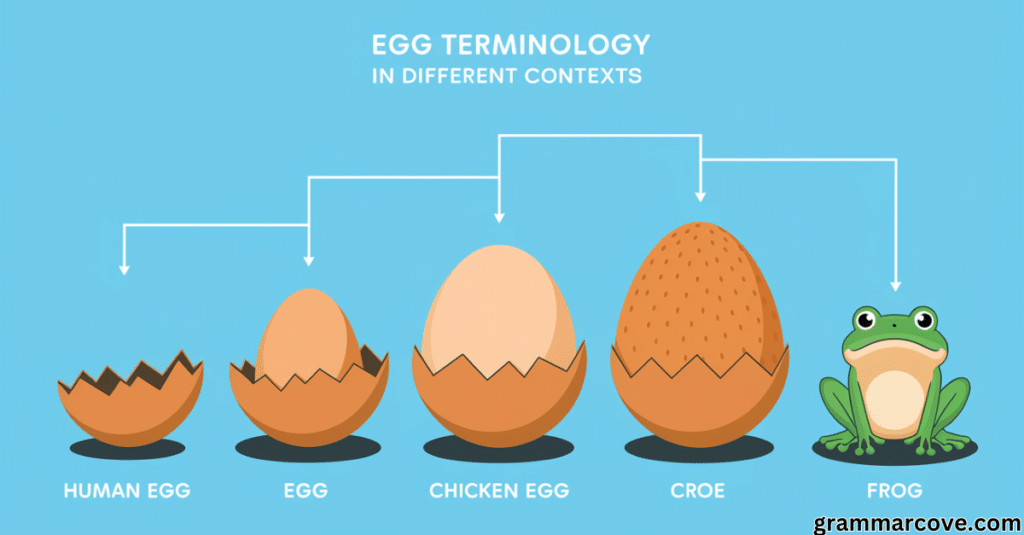Eggs are a staple in both the culinary world and nature, appearing in various forms and serving multiple purposes. They come from many different species, each with unique characteristics. Understanding the collective nouns for eggs helps us discuss them in contexts like wildlife, farming, and cooking.
In this article, we’ll explore the main collective nouns for eggs, provide real-world scenarios for each, and delve into their linguistic and practical significance.
What Are Collective Nouns?
Collective nouns are words that describe a group of things, animals, people, or concepts. They help us refer to multiple items as a single entity. For instance, we say a “herd of cows” or a “flock of birds.” In the case of eggs, several terms capture different aspects of grouping eggs together for various purposes.
Common Collective Nouns for Eggs
The following table summarizes some popular collective nouns for eggs and the specific situations where they are most applicable:
| Collective Noun | Meaning | Typical Use Case |
|---|---|---|
| Clutch of eggs | A group of eggs laid at one time by a bird or reptile | Natural wildlife settings, egg incubation |
| Batch of eggs | A collection of eggs gathered for a specific purpose | Farming, culinary uses |
| Carton of eggs | Eggs packaged together for sale or storage | Retail, grocery shopping, commercial settings |
| Nestful of eggs | Eggs found in a bird’s nest, representing the whole nest | Wildlife observation, birdwatching |
| Dozen eggs | A set of twelve eggs, commonly used in commerce | Cooking, retail, recipe measurements |
Clutch of Eggs:
A clutch of eggs refers to a group laid by a bird, reptile, or amphibian at the same time. This term is often used in nature and zoology to describe eggs that are incubated together.
Example Scenario:
If you’re writing an email to a nature enthusiast group, you might say:
“Dear Group,
During my recent hike, I spotted a rare species of hawk guarding its clutch of eggs. It was fascinating to observe the bird’s protective behavior, ensuring the eggs remained safe and warm.”
The term “clutch” focuses on the egg incubation aspect, emphasizing the biological effort of the parent to nurture the eggs.
Batch of Eggs:
A batch of eggs is commonly used in farming or culinary settings. It refers to a collection of eggs gathered for a particular purpose, such as cooking or selling.
Example Scenario:
In a note to kitchen staff, you could write:
“Hey team,
Today’s baking will use a new batch of eggs delivered fresh from the farm this morning. Please check each egg for quality before using them in our recipes.”
The word “batch” is ideal for describing culinary uses of eggs, where quality and freshness are important.
Carton of Eggs:
A carton of eggs is a practical term for packaging eggs, usually containing a specific number like six, twelve (a dozen), or even thirty.
Example Scenario:
While discussing inventory with a supplier, you could say:
“Hi Susan,
We need 100 cartons of eggs for next week’s order, with each carton containing a dozen eggs. Make sure they are labeled as farm-fresh eggs for our customers.”
The term “carton” emphasizes packaging and egg-related terminology in commercial settings.
Nestful of Eggs:
The term nestful of eggs describes eggs found in a bird’s nest, representing a natural grouping. It is suitable for wildlife contexts and observations.
Example Scenario:
In a nature diary, you might write:
“During today’s birdwatching trip, I came across a robin’s nest holding a nestful of eggs. The delicate shells, arranged snugly together, were a beautiful sight amidst the dense foliage.”
Using “nestful” evokes images of bird nests and the social behavior of birds, highlighting the natural setting.
Dozen Eggs:
A dozen eggs refers to exactly twelve eggs, commonly used in retail and cooking. This is a standard measure found in recipes and packaging.
Example Scenario:
In a marketing email for a local grocery store, you could include:
“Dear Customers,
This weekend, buy two dozen eggs and get a free loaf of bread! Stock up on our fresh, locally-sourced eggs while supplies last.”
The term “dozen” is convenient for standardized retail purposes and culinary uses of eggs.
Egg Terminology in Different Contexts:

Understanding egg terminology across different scenarios can help you grasp the full range of how eggs are perceived and used. Let’s look at some specific contexts:
Egg Incubation:
In egg incubation, terms like clutch of eggs or nestful of eggs are used to describe the eggs being warmed for hatching. These words relate closely to the nature of eggs and the reproductive behaviors of birds, reptiles, and amphibians.
Farm-Fresh Eggs:
In farming, terms like batch of eggs and carton of eggs help distinguish between eggs collected for immediate sale and those set aside for hatching. The emphasis here is on the quality and freshness of farm-fresh eggs.
Example Scenario:
In a farming advertisement, you might write:
“Our hens lay only the finest farm-fresh eggs, gathered daily and packed in sustainable cartons of eggs. Experience the taste of quality with every purchase.”
Culinary Uses of Eggs:
In cooking, eggs are often described in terms like dozen eggs or batch of eggs, especially when following recipes or discussing meal preparations.
Example Scenario:
At a culinary school, an instructor could say:
“For this cake recipe, you’ll need at least two dozen eggs. Be sure to use a batch of eggs that is at room temperature for the best results.”
Linguistic Aspects of Egg Terminology:
The linguistic aspects of eggs reveal a range of meanings based on how eggs are grouped and described. For example, a clutch emphasizes the nurturing aspect of egg-laying, while a carton focuses on packaging and commerce.
Social Behavior of Birds and Eggs in Nature:
Birds exhibit unique behaviors in how they lay and care for their eggs. Some species, like penguins, may lay a small clutch of eggs and take turns incubating, while others, such as ducks, may form a large nestful of eggs.
Scenario Example:
A wildlife report might include:
“Observations this season revealed that the goose population tends to lay a clutch of eggs in communal nests. This behavior ensures greater warmth and protection from predators.”
Egg Diversity Across Species:
Different species lay various types of eggs, exhibiting egg diversity. Chicken eggs differ from turtle eggs in size, shape, and shell texture.
Nouns Describing Groups: The Role of Context:
Nouns describing groups like “batch” and “carton” help convey specific meanings depending on the context. The right terminology can enhance clarity when talking about eggs in farming, wildlife, or cooking.
Conclusion
Understanding the different collective nouns for eggs—such as clutch, batch, carton, nestful, and dozen—adds depth to our language, especially when discussing the nature of eggs or their culinary uses. Each term serves a purpose, whether in wildlife, retail, or cooking.


